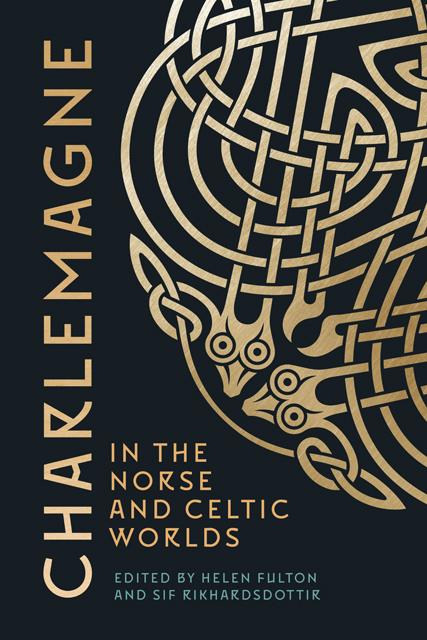Book contents
- Frontmatter
- Contents
- List of Maps and Figures
- List of Contributors
- General Preface: Charlemagne: A European Icon
- Acknowledgements
- Map
- Introduction: Transmission of Charlemagne in Scandinavia, Wales, and Ireland
- Part I The Norse Charlemagne
- Part II The Celtic Charlemagne
- Bibliography
- Index
- Bristol Studies in Medieval Cultures
7 - Irish Charlemagne Texts: Narratives, Poems, and Genealogies
Published online by Cambridge University Press: 08 June 2023
- Frontmatter
- Contents
- List of Maps and Figures
- List of Contributors
- General Preface: Charlemagne: A European Icon
- Acknowledgements
- Map
- Introduction: Transmission of Charlemagne in Scandinavia, Wales, and Ireland
- Part I The Norse Charlemagne
- Part II The Celtic Charlemagne
- Bibliography
- Index
- Bristol Studies in Medieval Cultures
Summary
This chapter sets out to provide a general introduction to Irish narratives, poems, and genealogies in which Charlemagne features, and to their contents, sources, and concerns. It will also characterise briefly the dominant stylistic choices made by the translators of the narratives, along a scale of ‘unadorned’ to ‘florid’, which represent the two major stylistic options available to late medieval and early modern Irish redactors of foreign sources.
Narratives
Sdair Shéarluis Mhóir (‘The History of Charlemagne’) is the Irish analogue of the French chanson de geste Fierabras. Because of the close relation between the French and the Irish versions, the latter’s editor, Whitley Stokes, introduced the title Stair Fortibrais (‘The Story of Fortibras’). The Irish text, however, closes with the phrase ‘co tairrnig sdair Serluis moir ag lenmainn coroine Crist 7 taissi no naemh’ (‘and the history of Charles the Great, pursuing the crown of Christ and the relics of the saints, ends’), an explicit characteristic for ending a tale in an Irish style with a reference to its content and its name or tale-type, namely ‘sdair’. I therefore prefer Sdair Shéarluis as a convenient brief title here.
Sdair Shéarluis is not an immediate translation or adaptation of the French Fierabras but closely follows a Latin translation of the French Fierabras. An incomplete text of this translation is extant in Dublin, Trinity College 667 (formerly F.5.3), where it begins ‘Hinc incipiunt Gesta Karoli Magni et cetera’ – which corresponds to the wording of the Irish explicit and supports the choice of the Irish title Sdair Shéarluis. The title Gesta Karoli Magni would therefore be appropriate for the Latin translation of the French Fierabras but is already reserved for the standard short form title used for the Latin Pseudo-Turpin Chronicle; I will therefore refer to it simply as the ‘Latin translation of Fierabras’.
The explicit of Sdair Shéarluis directs the focus of the narrative onto Charles and his endeavours to recover the set of relics that at the outset of the story the pagan emperor Admirandus and his son Fortibras (the Irish Fierabras) are reported to have brought to their capital after having sacked Rome and killed the pope.
- Type
- Chapter
- Information
- Charlemagne in the Norse and Celtic Worlds , pp. 132 - 149Publisher: Boydell & BrewerPrint publication year: 2022



